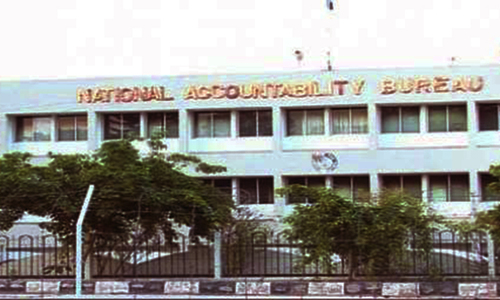ISLAMABAD: The Supreme Court has suggested that lawmakers may consider amending the National Accountability Ordinance (NAO) 1999 to enable an accused person to apply for bail to an accountability court.
“In the changed scenario, the legislature may, if so advised, consider amending the National Accountability Ordinance, 1999 appropriately so as to enable an accused person to apply for his bail before the relevant accountability court in the first instance,” wrote Justice Asif Saeed Khosa in a judgement on the plea of Tallat Ishaq, who had sought leave to appeal against the Jan 31 ruling of the Balochistan High Court in which his post-arrest bail was refused in a corruption reference filed by the National Accountability Bureau (NAB) against him and others under Section 18(g) read with Section 24(b) of the NAO.
Justice Khosa also recommended revising the unrealistic time frame for conclusion of a trial as specified in Section 16(a) of the NAO. The time frame under the NAB law is 30 days.
In a judgement, Justice Khosa also recommends revising unrealistic time frame for conclusion of trial
The intention behind introduction of Section 9(b) of the NAO, which ousted the jurisdiction of the superior courts regarding grant of bail in a case under NAO, already stood neutralised due to opening of the door for bail through exercise of constitutional jurisdiction of a high court, Justice Khosa observed.
Resultantly, the entire burden was being shouldered by the high courts, which was an unnecessary drain on their precious time, he explained, adding that the high courts and the Supreme Court had always felt difficulty in adjusting the requirements of “without lawful authority” and “of no legal effect” relevant to a writ of certiorari (Article 199(1)(a)(ii) of the Constitution) with the requirements of bail provided in Section 497 of the Criminal Procedure Code (CrPC).
Ishaq was facing the allegation that in his capacity as superintendent in the office of Director Development, Quetta Division, he had acquired assets beyond known sources of income in his own name and in the names of his wife and others.
According to the prosecution, he had acquired 17 immovable properties worth Rs93 million and six vehicles.
The same question was highlighted by senior counsel Khawaja Haris Ahmed while defending former prime minister Nawaz Sharif and his daughter Maryam Nawaz before the apex court in the appeal moved by NAB against the Sept 19 decision of the Islamabad High Court to suspend the jail term awarded to the Sharifs in the Avenfield apartments reference.
In this case the Supreme Court has already constituted a larger bench to consider if constitutional jurisdiction to grant bail should be invoked when there is a statutory ouster of courts to grant bail pending appeal against special courts, like the accountability court, particularly in cases involving grant of bail by suspending the sentence and release on bail during pendency of the appeal.
The larger bench will also ponder over the jurisdiction of the superior courts regarding ouster of Section 426 of the CrPC for suspension of sentences in NAB cases. It will also ascertain the principles regulating bail under sections 497 and 498 of the CrPC while considering the suspension of sentences.
In his verdict, Justice Khosa observed that the stand taken by Ishaq before the apex court regarding properties in question were ostensibly mutually contradictory.
“The case against Ishaq is quite distinguishable from the case against his co-accused who had been admitted to bail by the high court since Ishaq is the principal accused in this case whereas the co-accused are alleged to be Benamidars only,” Justice Khosa observed, adding that no reason was cited to show why delay occurred in the conclusion of his trial and who was responsible for it.
Published in Dawn, November 18th, 2018













































